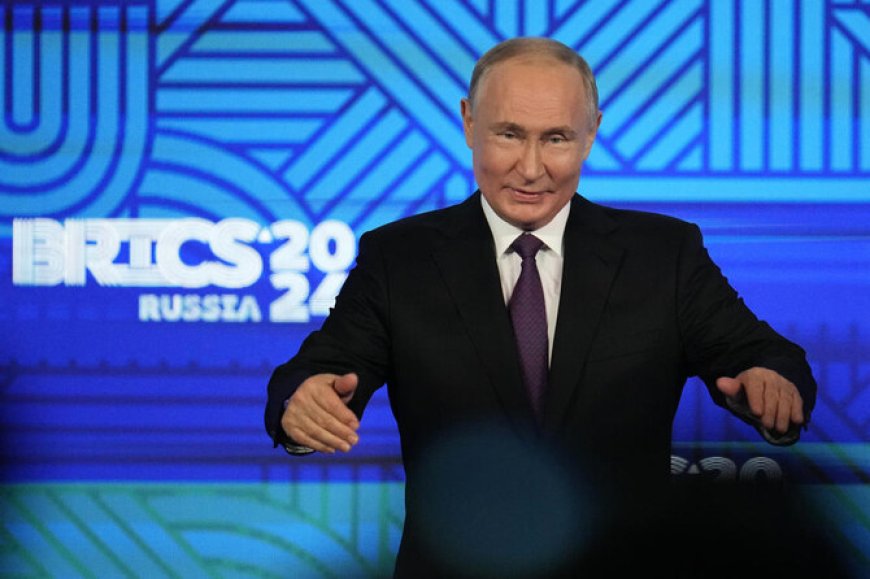Putin's BRICS Vision: A Challenge to Western Economic Domancy

Once more claiming his place on the global economic chessboard, Russian President Vladimir Putin is positioning the BRICS group at the core of future world development. Speaking on Friday ahead of an upcoming BRICS summit in Kazan, Russia, Putin boldly declared that the enlarged BRICS group—now comprising Egypt, Ethiopia, Iran, and the UAE alongside Brazil, Russia, India, China, and South Africa—will be in charge of generating world economic growth in the next years.
But under the economic hope is a distinct geopolitical plan. BRICS for Putin is more than simply a group of rising economies; it's a possible counterpoint to Western hegemony, a bloc that might restructure the world financial system away from the supremacy of the U.S. dollar and the political impact of the West. Beyond trade numbers and GDP estimates, Putin's aspirations for BRICS see the organization as a means of redefining the international order free from what he refers to as Western countries' "external influence or interference."
The timing of this conference is important as the globe negotiates several crises, from the war in Ukraine to mounting geopolitical concerns in Asia. Moscow is presenting the BRICS alliance as proof that Western attempts to isolate Russia over activities in Ukraine have not only failed but also backfired. In his comments, Putin highlighted how the BRICS countries—many of which are seeing fast development relative to their Western counterparts—are now the main drivers of world GDP increase.
This story, nevertheless, hides a more complicated reality. The bloc is far from a united body even if BRICS does account for a sizable fraction of the world's population and a rising amount of international economic activity. Every nation in BRICS has political agenda, economic interests, and regional issues unique to itself. While Brazil and South Africa deal with domestic political and economic unrest, India and China still struggle over border issues. Nonetheless, Putin's rhetoric presents BRICS as a united force ready to challenge Western hegemony by using the combined might of its members to carve out a new arena in world affairs.
Reducing the dependency of BRICS countries on Western financial institutions and systems is fundamental in Putin's strategy. Russia has long been advocating a reform of the world financial system, and now, given sanctions and increasing distance from the West, that drive has become more urgent. Putin underlined during the summit projects indicating a departure from the conventional dominance of Western systems, including the building of a cooperative cross-border payments system and a reinsurance firm. He also underlined the function of the international development organization known as BRICS' New Development Bank (NDB), which he praised as a practical substitute for Western financial institutions.
According to Putin, BRICS might spearhead a movement of economic autonomy whereby group development is sheltered from Western economic impact. Seeing these areas as cornerstones of future development and independence, he is especially eager to increase investments in innovative fields such artificial intelligence and e-commerce. The Russian president believes that the development of BRICS infrastructure—especially through initiatives like the Arctic Sea Route and the North-to--south corridor—particularly will help to link Eurasian economies with Africa and the Gulf, so opening up important trade channels that avoid conventional Western trade routes.
Notwithstanding Putin's confident presentation, BRICS confronts issues that might compromise the great aspirations of the Russian leader. Above all, the various political and financial interests of BRICS members hamper any attempt to project a single front. Furthermore, even if the BRICS group may have grown, many of its newest members—Egypt, Ethiopia, and Iran—are themselves struggling with serious economic problems. It remains unknown if these countries can significantly help BRICS to achieve their shared objectives.
The West, especially the U.S. and European Union, is unlikely to accept these changes sitting down either. Russia wants to change the world financial system and move away from the U.S. currency, but it is far from clear BRICS has the clout or cohesiveness to reach these goals in not too distant future. The dollar is still firmly ingrained in world commerce, and most BRICS nations still depend on very Western banking institutions that Putin aims to challenge.
Still, Russia has a chance to demonstrate that it is not alone and that it still has a seat at the table of global power—albeit in a fresh and changing setting—during the forthcoming BRICS conference in Kazan. Putin is keen to show that BRICS can present a substitute for Western-dominated institutions and alliances as China, India, and the UAE have verified the participation of their leaders.
BRICS has the ability to provide new paths for world commerce, development, and diplomacy as the global order changes and power is more spread among several centers instead of a unipolar U.S.-dominated system. For all of Putin's hyperbole, though, the path ahead for BRICS is still steep and the bloc's actual influence on the international scene is yet unknown.













































